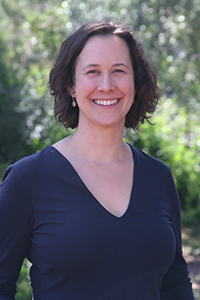Kathryn Lanouette joins Curriculum & Instruction faculty
 Tell us a little about your background and what brought you to W&M.
Tell us a little about your background and what brought you to W&M.
I grew up in Washington, D.C. and taught in elementary schools and informal science contexts in New York City before starting my Ph.D. at the University of California Berkeley. While at UC Berkeley, I had the opportunity to collaborate with faculty and students in the School of Information and School of Education, exploring the potential of digital tools to support ambitious and equitable science learning opportunities for K-12 students. I am excited to be back east and joining the William & Mary community, with its combination of a public liberal arts education with regional, national, and international interdisciplinary research collaborations.
What’s your area of research and what question are you most passionate about answering right now?
In my research, I am studying the ways in which children’s science learning develops across multiple contexts, with a focus on the intersections of data, place, and mapping. I draw on design-based research methodologies to imagine, design, and study children’s learning about complex socio-ecological systems.
I am particularly interested in how children’s rich connections to everyday people and places can be integral to their science learning, particularly in ecology. In one line of inquiry, I am curious about the possibilities and limits of digital mapping tools, like participatory GIS maps, to support children’s learning about complex systems and data in ways that sustain and make space for their perspectives and voices. In a second line of analysis, I am examining how children’s emergent emotions, like delight, competition and empathy, shape how they engage in ecologists’ practices like observation of the natural world, experiment design and data visualization.
What else are you hoping to get involved with on campus or in the community?
I am excited to connect with my colleagues here in the School of Education and across campus in Arts & Sciences, especially with the Center of Geospatial Analysis and the Institute for Integrative Conservation. I am also eager to connect with educators in the local area, imagining together collaborations that support ambitious and equitable science learning that engages directly with pressing science issues like climate change.